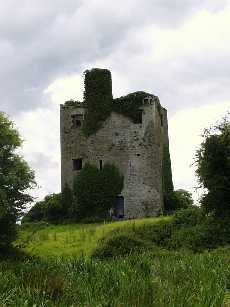|
The Irish for Cratloe is Creat Shaileóg,or Creath
Saileág which means 'the rough land of the sallow trees' or
'the rough place where the sallies grow'. However, the original name is
sometimes given as Croit Shliabh, which means a 'humped back
mountain'.
The original parish name was Kilfintinan before it became known as Cratloe.
There is no Irish saint listed as Fintinan and so it is believed that
the parish name is derived from Cill Fionn tSeanain, which means
'the church of the fair Senan'. Due to the shortage of clergy in the mid-18th
century, the priests in Kilfintinan took over part of the neighbouring
parish of Killeely.
Oak from Cratloe Woods was used to roof the Houses of Parliament at Westminster
and the Royal Palace at Amsterdam.

© Cratloe Moyle Castle
In the parish there is a number of castles, namely Cratloe Moyle, Cratloe
More, Ballintlea (also known as Castle Quarter), Castle Donnell and Cratloe
Keel. The MacNamara family built these castles between the 15th and 17th
centuries. Cratloe Moyle has the largest ruin, but the ruins of Cratloekeel,
Castle Donnell and Ballintlea castle are still in existence.
Bunratty Castle is a 15th Century castle which was a stronghold of the
Earls of Thomond. Limerick was under the rule of the Confederate troops
at this time. The castle was under the control of Admiral Penn, father
of the founder of Pennsylvania, William Penn. Admiral Penn surrendered
after a long and bloody siege and sailed away to Kinsale. Bunratty Castle
is now a popular tourist attraction and there is also a Folk Park on the
site.
 
|